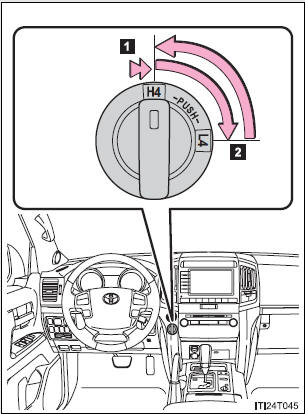 Toyota Land Cruiser Owners ManualWhen driving » Using other driving systems
Toyota Land Cruiser Owners ManualWhen driving » Using other driving systems
Four-wheel drive system
Four-wheel drive system
Use the four-wheel drive control switch and center differential lock/ unlock switch to select the following transfer and center differential modes.
- Four-wheel drive control switch

- “H4” (high speed position)
Normal driving on all types of roads.
- “L4” (low speed position)
Driving requiring maximum power and traction such as climbing or descending steep hills, off-road driving, and hard pulling in sand or mud, etc.
- Center differential lock/unlock switch

Lock the center differential when your vehicle’s wheels get stuck in a ditch or when driving on a slippery or bumpy surface.
Unlock the center differential after the wheels have been freed, or after moving to a flat, non-slippery surface.
Shifting between “H4”and “L4”
- Shifting from “H4” to “L4”
STEP 1
Stop the vehicle completely.
STEP 2
Shift the shift lever to “N”.
STEP 3
Push and turn the four-wheel drive control switch fully clockwise.
Maintain this condition until the low speed four-wheel drive indicator light turns on.
- Shifting from “L4” to “H4”
STEP 1
Stop the vehicle completely.
STEP 2
Shift the shift lever to “N”.
STEP 3
Turn the four-wheel drive control switch fully counterclockwise.
Maintain this condition until the low speed four-wheel drive indicator light turns off.
- The four-wheel drive control switch can be operated when
- The “ENGINE START STOP” switch is in IGNITION ON mode.
- The shift lever is in the “N” position.
- The vehicle is stopped completely.
- The low speed four-wheel drive indicator light
The indicator light blinks while shifting between “H4” and “L4”.
- Advice for driving on slippery roads
- If you shift the four-wheel drive control switch to “L4” and the shift lever to the “2” range of “S” while driving in steep off-road areas, the output of the brake can be controlled effectively by the Active TRAC, which assists the driver to control the driving power of 4 wheels.
- Use the “1” range of “S” of the shift lever for maximum power and traction when your wheels get stuck or when driving down a steep incline.
- The center differential lock indicator light
The indicator light blinks while locking/unlocking the center differential.
- The center differential lock/unlock switch can be operated when
- The “ENGINE START STOP” switch is in IGNITION ON mode.
- The vehicle speed is less than 60 mph (100 km/h).
- Locking/unlocking the center differential
- When the four-wheel drive control switch is in L4 with the center differential locked, VSC is automatically turned off. (The center differential lock and VSC OFF indicator lights come on.)
- If the operation is not completed, the center differential lock indicator blinks. If the indicator light does not turn off when unlocking the center differential, drive straight ahead while accelerating or decelerating, or drive in reverse.
- If the center differential lock/unlock is not completed within 5 seconds while the cruise control system is on, cancel the cruise control system.
- If the low speed four-wheel drive indicator light or the center differential lock indicator light blinks
- If the low speed four-wheel drive indicator light continues to blink when using the four-wheel drive control switch, stop the vehicle completely, move the shift lever to “N” and operate the switch again.
- If the shift lever is moved before the low speed four-wheel drive
indicator
turns on/off, the transfer mode may not be shifted completely. The transfer
mode disengages both the front and rear driveshafts from the powertrain
and allows the vehicle to move regardless of the shift position. (At
this time, the indicator blinks and the buzzer sounds.)
Therefore, the vehicle is free to roll even if the automatic transmission is
in
“P”. You or someone else could be seriously injured. You must complete
the shifting of the transfer mode.
To complete the shifting, stop the vehicle completely, return the shift lever to “N”, and confirm that the shift was completed (the indicator turns on/off).
- If the engine coolant temperature is too low, the four-wheel drive control system may not be able to shift. When the engine is warmer press the switch again.
If the low speed four-wheel drive indicator light or the center differential lock indicator light continues to blink even after attempting the above, there may be a malfunction in the engine, the brake system or the four-wheel drive system.
In this case, you may not be able to shift between “H4” and “L4”, and the center differential lock may not be operable. Have the vehicle inspected by your Toyota dealer immediately.
|
CAUTION
Never move the four-wheel drive control switch if the wheels have lost traction. Doing so may cause an accident resulting in death or serious injury.
If the shift lever is moved before the low speed four-wheel drive indicator turns on/off, the transfer mode may not be shifted completely. The transfer mode disengages both the front and rear driveshafts from the powertrain and allows the vehicle to move regardless of the shift position. (At this time, the indicator blinks and the buzzer sounds.) Therefore, the vehicle is free to roll even if the automatic transmission is in “P”. You or someone else could be seriously injured. You must complete the shifting of the transfer mode. |
NOTICE
|
